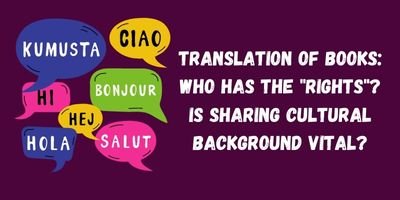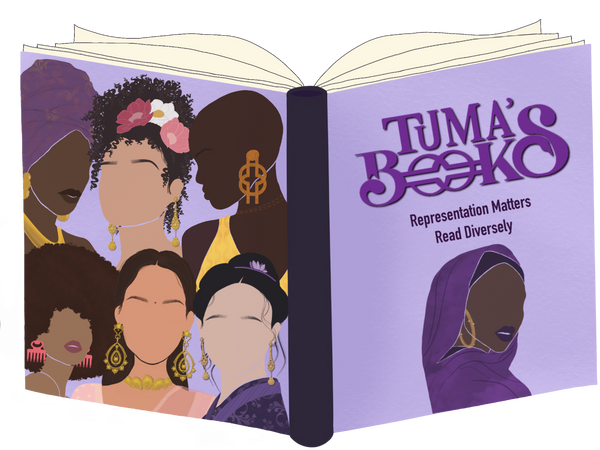
Translation of Books: Who has the "rights"? Is sharing cultural background vital?
Fatuma HydaraWho should translate an author's work? Should the translator share the author's cultural or ethnic background?
In researching titles for my March Mystery Box, Women in Translation, I came across an article on UNESCO titled "Do translators need to resemble the authors they translate?" by Lori Saint-Martin and it got me thinking.
The article explores how the act of translation in of itself is an "experience of otherness, even when the person translated is culturally similar to us." When a Dutch publishing house announced that a young non-binary person would translate Amanda Gorman's poem performed at the U.S. President Joe Biden's inauguration ceremony in 2021, a journalist questioned why a young, Black woman was not chosen instead. While the publisher quickly withdrew their project, many felt they should have the right to translate works by people very different from themselves.
I strongly believe in the power of people, especially BIPOC folks, telling their own stories. It lessens the chances of harmful representation or misinterpretation of cultural norms and mores. However, if we limit translation to translators who share similar backgrounds, then we are limited who/what gets translated.
This debate of one's right to translate whatever they want vs. rights of identity representation is more nuanced that the loudest protestors make it out to be. The question of "who can translate whom" is actually an issue of politics. Like in most institutions, publishing and translation is not fair or equitable. The industry practices are a reflection of our world's history of power struggles (Saint-Martin).
The increased translated works from publishers and in bookstores creates an illusion of increased diversity. However, there is a clear pattern in who gets translated and the languages we translate from and to. (Saint-Martin) Works in English are often translated from western languages and usually by men; "until very recently, the history of translation has been one of white privileged males translating one another" (Saint-Martin). Translation is deeply tangled up with racial, linguistic, and cultural hierarchies around the world.
For example, BIPOC women authors who are translated into English for U.S. (or other English-speaking) readers are often those who have written in their colonizer's languages (English, Dutch, French, Italian, Portuguese, Spanish, etc.), published in NY, London, Paris (Saint-Martin). A Black, Senegalese woman writing is French is far more likely to be translated than a Black, Senegalese women writing in Wolof. However, we have to consider the number of French to English translators vs. Wolof to English translators. Considerations for how to increase access to learning languages for those who speak non-dominant languages is incredibly important if we aim to create true diversity and equity in translation.
Another argument comes from proponents of the "classics" claiming that the "greatest works" are the ones translated, but who gets to decide what are the "greatest works". Typically, those apart of the dominant culture, of course. In 2017, a study by the Author's Guide found that 83% of working translators were White and 1.5% were Black (Saint-Martin). That's highly problematic. The field of translation, like publishing, needs to be opened up to non-White and non-male folks, in order to provide access to new, diverse translators.
So, back to the question at hand--should a work only be translated by someone who shares the author's ethnic or cultural background? Even if someone shares the same background with the author, it doesn't mean they're automatically the best person to translate a work. Other considerations are style, voice, or experience with the subject (Saint-Martin). Accordingly to novelist, Alain Mabanckou, "For me, it doesn't matter what colour the cat is, so long as it catches the mouse" (qtd in Saint-Martin). So, as long as the translator is able to do justice to the work, maintaining all cultural nuance and voice, then anyone should be able to translate.
The fact of the matter is that many translators who work with US publishers seem to be White. Translation is an acquired skill that is to be admired. Translators not only learn another language but master it, in order to be able to accurately translate an entire work. I do not want to take away from that accomplishment. However, I wonder if translators value the cultural capital within a novel written in its native tongue. What is lost if translators do not make sure to not only understand the language but the cultural nuances as well when translating a work.
In the end, translation "[a]t its best, … is diversity itself, the world, worlds, at our fingertips" (Saint-Martin). It makes other people realize that they are NOT at the center of the world, helping to disrupt dominant ideology and offer other perspectives. It's important to diversify our reading with translated works. However, we also need more to help translate less privilege and diverse writers and one way to do this is to diversify the pool of translators.
Source:
Saint-Martin, Lori. “Do Translators Need to Resemble the Authors They Translate?” The UNESCO Courier, The UNESCO Courier, 2022, https://courier.unesco.org/en/articles/do-translators-need-resemble-authors-they-translate.
